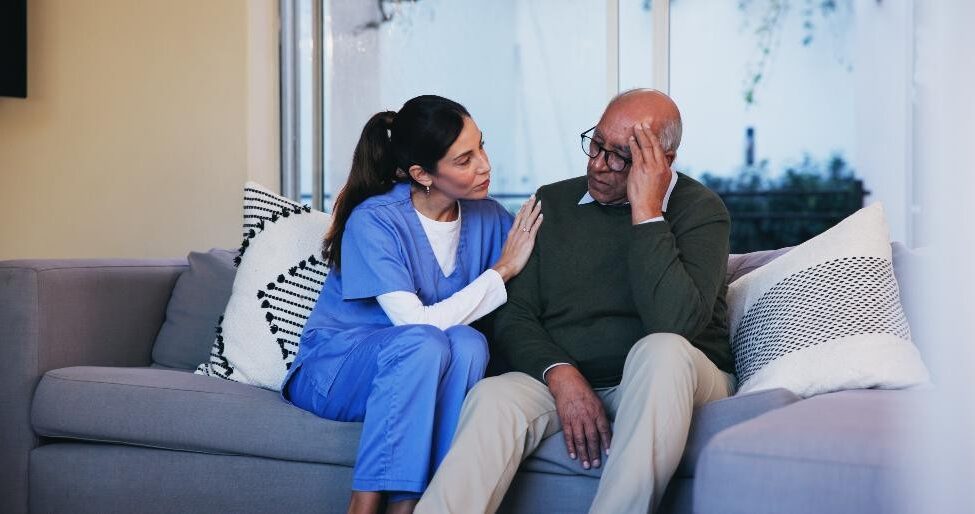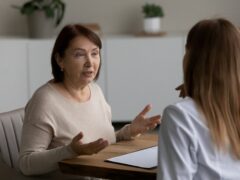What is dementia?
Dementia isn’t a disease. It’s a group of symptoms that can be caused by changes in brain structure. Dementia often occurs in older people. However, it’s not related to normal aging. Alzheimer’s disease is the most common form of dementia.
Dementia makes it hard for people to remember, learn, and communicate. It may cause changes in mood and personality, such as depression. Early on, memory lapses and foggy thinking may bother someone who has dementia. Later, disruptive behavior and other problems can create a burden for caregivers and family. Over time, these changes make it hard for people who have dementia to care for themselves.
Symptoms of dementia
Symptoms of dementia may appear over time or all at once. Sometimes you may notice the symptoms in yourself. Sometimes those around you may notice them first. Either way, if you have two or more of the symptoms listed below, visit your doctor right away.
- Recent memory loss. It’s common to forget things for a while and remember them later. People who have dementia often forget things but never remember them. They may cook a meal but forget to serve it. They might even forget that they cooked it.
- Difficulty performing familiar tasks. People who have dementia may struggle with simple things, like getting dressed. They may wake up and get dressed, then hours later get dressed again. They may forget how to tie their shoes or that milk needs to be refrigerated.Problems with language. People who have dementia may forget simple words or use the wrong words. This makes it hard for them to communicate and hard for others to know what they need.
- Time and place. People who have dementia may get lost on their own street. They may forget how they got to a certain place or how to get back home.
- Being absent-minded. Everyone gets distracted at times. People who have dementia can forget simple things. Examples are not putting on a coat before going outside when it’s cold or not using an umbrella when it rains.
- Problems with abstract thinking. Anyone can have trouble balancing a checkbook. People who have dementia may forget what the numbers are and what to do with them.
- Misplacing things. People who have dementia may put things in unusual places. They might put an iron in the freezer or a wristwatch in the refrigerator. When they can’t find the things, they may get upset or accuse others of stealing.
- Personality changes. People who have dementia may have drastic changes in personality. They might become irritable, suspicious, fearful, or depressed.
- Changes in mood. Everyone is moody at times, but people who have dementia can have sudden mood swings. They may go from calm to tears to anger in a few minutes.
- Loss of initiative. People who have dementia may become passive. They might not want to go places or see other people.
What causes dementia?
Dementia is caused by the damage of brain cells. A brain disease, such as Alzheimer’s, could trigger dementia. A brain tumor, head injury, or stroke could cause dementia.
Dementia isn’t the same as normal aging. As you get older, it becomes harder to recall information. Your short- and long-term and remote memories are less affected by aging. Your recent memory is more affected. For example, you may forget what you ate for breakfast or where you set your keys. These are normal changes.
A memory problem is serious when it affects your daily life. Memory problems that aren’t part of normal aging include:
- Forgetting things more often than you used to
- Forgetting how to do things you’ve done many times before
- Trouble learning new things
- Repeating phrases or stories in the same conversation
- Trouble making choices or handling money
- Not being able to keep track of what happens each day
- Talk to your doctor about any concerns you have. They can decide if a medicine or condition may be affecting your memory.
How is dementia diagnosed?
Your doctor will do a physical exam and review your symptoms. They can do tests to find out if dementia is the cause of your symptoms. The sooner you do this, the sooner you can talk about treatment options.
If your family member shows signs, try to get them to see a doctor. You may want to go to the visit with them. This lets you speak with the doctor in private. You can tell them how your loved one is acting and learn about treatment.
Can dementia be prevented or avoided?
There is little you can do to prevent or avoid dementia. If you have a head injury or brain tumor, ask your doctor if there are lifestyle changes you can make. You’ll want to take precautions to avoid additional head trauma or concussions. If you’re at risk of stroke, talk to your doctor about possible preventions.
Currently, the American Academy of Family Physicians (AAFP) concludes that the current science doesn’t clearly demonstrate if screening for cognitive impairments has more benefit that harm.
Dementia treatment
Some causes of dementia can be treated. However, once brain cells have been destroyed, they can’t be replaced. Treatment may slow or stop more brain cell damage. When the cause of dementia can’t be treated, the focus of care is on helping the person with their daily activities and reducing symptoms. Some medicines can help slow down the progression of dementia. Your family doctor will talk with you about treatment options.
Living with dementia
There is no cure for dementia. People who have dementia should learn how to manage symptoms. Dementia is hard for the people who have it, as well as the people who love them. It’s important for family to learn about the condition and help their loved one. This may include visiting more, helping out, hiring medical care, or switching residences.
People who have dementia may become agitated for various reasons. Examples are frustrating or stressful situations, or a sudden change in surroundings. Simple things such as getting dressed or not remembering can lead to frustration. It’s possible that a person who is irritable may try to hurt themselves or others. Try to avoid things or places in which your loved one might become frustrated. Try to make your loved one’s tasks less difficult. You also can try to limit the number of difficult situations your loved one must face. For example, if taking a daily bath or shower causes problems, have him or he take one every other day. Or schedule difficult tasks for a time of day when your loved one tends to be less agitated. It’s helpful to give frequent reassurance and avoid challenging them.
Some people who have dementia may have hallucinations. These can be scary or upsetting. Try to distract the person by involving them in a pleasant activity. It’s best not to argue or fight with them when they’re hallucinating. You don’t want to agitate them more.
If your loved one is having trouble sleeping, try the following:
- Make the person aware of what time of day it is. Place clocks where they can easily see them.
- Keep curtains or blinds open so they can tell if it’s daytime or nighttime.
- Limit the amount of caffeine they consume.
- Try to help them exercise every day.
- Don’t let them take too many naps during the day.
- Make their bedroom peaceful. It’s easier to sleep in a quiet room.
- At night, provide a nightlight or leave a dim light on. Total darkness can add to confusion.
- Ask the doctor about medicine to treat pain, such as for arthritis. Some conditions can interrupt a person’s sleep.
If your loved one is prone to wandering, try these solutions:
- Allow them to wander in a safe place, such as a fenced yard.
- Tell them not to leave the house by themselves. You can put a large stop sign on the door as a reminder.
- Install an alarm system that will sound when the door opens. You can set it so you’re alerted when this happens.
- Place special locks on the doors. Don’t use this method if your loved one is left home alone.
- Get a medical bracelet for them to wear. Include their name, address, medical conditions, and your phone number.
- Check in with them frequently by telephone and/or in person.
Questions to ask your doctor
- Does dementia run in families? Am I at risk?
- What types of medicines treat dementia? Are there any side effects?
- Are there any lifestyle changes that help improve the symptoms of dementia?
- Can you recommend a support group for people who have dementia and their families?
ADVERTISEMENT
ADVERTISEMENT




